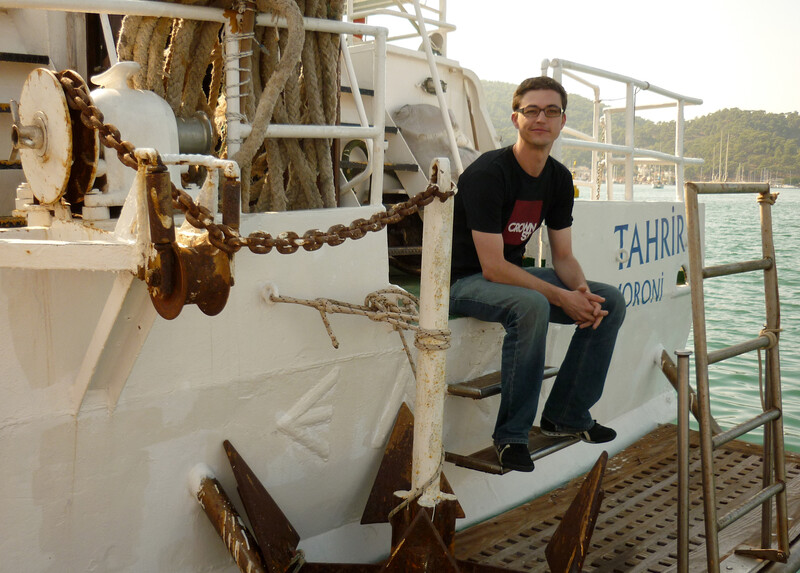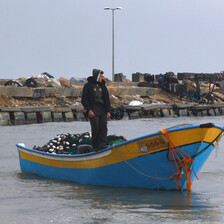The Electronic Intifada 28 November 2011

Michael Coleman aboard the Tahrir.
Anti-Semite. Holocaust-denier. Terrorist-supporter. The government of Israel as well as its lobbyists and supporters commonly use these labels to describe Palestine solidarity activists and to discourage criticism of illegal Israeli practices. In this polarizing context, the United States, the European Union and Australia have escalated efforts to discourage activism in support of Palestine, creating financial, legal and physical barriers to expressing solidarity.
A longtime activist and Sydney-based youth worker, Michael Coleman has become accustomed to the challenges. As the Australian delegate on the Tahrir boat with the recent Freedom Waves initiative, he recently confronted all of the barriers that the government of Israel could muster.
Coleman first visited the West Bank city of Nablus in 2008 as a volunteer, teaching English and computer-based music production with the humanitarian organization Project Hope. Coleman recalled that “once the excitement of experiencing a new culture wore off, the realization hit me that what I was witnessing in the West Bank was the systematic and methodical ethnic cleansing of Palestinians from Palestine. I resolved at that point to stand in solidarity with the Palestinian people until their human rights were upheld.”
After returning to Australia, he was eager to learn more and began participating in the Palestinian-led boycott, divestment and sanctions (BDS) campaign. Then, “following the massacre on the Mavi Marmara, a Turkish humanitarian aid ship with the May 2010 Gaza Freedom Flotilla, a friend Rihab Charida made an impassioned speech that ended with ‘There will be an Australian delegation on the next flotilla, who’s with me?’ and six of us put our hands up, and Free Gaza Australia was formed.”
This group successfully participated in Freedom Flotilla Two - Stay Human, which faced severe obstruction from the Greek authorities. Coleman was also involved in that trip, taking to the sea in a kayak to obstruct the Greek coast guard while boats from the flotilla attempted to launch.
In the context of both the violence inflicted on the Mavi Marmara and the international cooperation to prevent July’s Freedom Flotilla from leaving Greece, planning for the most recent flotilla required far greater secrecy. According to Coleman, the obstacles were primarily financial because “due to the covert nature of this new strategy we had to secure a loan for our share of the budget, as fundraising and promotion were not an option,” meaning that Coleman, now safely in Sydney, must retroactively seek funds.
Organizing such a large solidarity action would pose numerous challenges under normal circumstances, but he said that “there were also some issues around forming an executive to keep information sharing to a minimum.” Yet Coleman remains positive about the experience, joking that “personally, I just got sick of resetting the time and date on my phone, as every time sensitive information was discussed we had to remove the batteries from our phones.”
Piracy and kidnapping on the high seas
Moving from planning to implementation, Coleman joined his colleagues on the Tahrir in Turkey. While all aboard were in high spirits, they were also realistic in their preparation, especially when Israeli warships following the flotilla in international waters made it clear that boarding was imminent. “We did discuss how we would handle the boarding process as a group, we formed buddy pairs and nominated where we wanted to be during the boarding.” Coleman confirmed.
Agreeing in advance that they would not resist arrest, the group prepared for boarding in international waters. At this point, according to interviews with the other activists and journalists on board, Coleman was the most defiant. He clarified that “I did not resist the boarding in anyway, but I also did not cooperate in anyway.” Coleman went on to describe the boarding process, which involved the use of a water canon to ensure the compliance of crew and passengers.
In his own powerful account, Coleman said, “I was supposed to be at the port side door to the wheel house; however I was cleared out of there by the water canon, as that’s where the IOF [Israeli occupation forces] boarded the boat. I moved around to the starboard side with my buddy Majd, who was manning the other door to the wheel house. Because of the water canon by the time the IOF boarded all the delegates except [fellow activists] David and Ehab, who were in the wheel house, were together sheltering from the water canon on the starboard side of the Tahrir. So the boarding process really only involved the IOF clearing out the wheel house and bringing David, Ehab and George, our captain, to where the rest of us were on the starboard of the boat — which they did with the use of tasers. This was the point where I began to become more defiant seeing David [Heap] being pushed from the wheel house with blood dripping down his forehead, as he had banged his head after being tasered.”
Having just witnessed these aggressive actions, Coleman detailed his efforts to avoid cooperation. “I then challenged every direction that was made of me and stated at every opportunity ‘you have the responsibility as an occupying force to allow free access of humanitarian goods to the occupied territories’ and ‘that Israel has no authority to board a Comoros Islands-flagged ship in international waters — this is an act of kidnapping and piracy.’”
Illegal detention
After the ships had been boarded, the Tahrir as well as the Irish-led Saoirse and their passengers were forced to enter the port of Ashdod in Israel. All of those on board were subject to full body searches and then taken to Givon prison, where they were held after refusing to sign a document stating that they had entered Israel illegally. Despite the actions of the government of Israel, morale among the Freedom Waves detainees remained high even at Givon where they were quick to organize themselves.
“We were lucky to have the Irish boys with us, I think we had only been in the prison under ten hours and they had already formed a prisoner committee and where making demands on the prison authorities for free association, provision of reading and writing materials, knowledge of our sisters being held in another wing of the prison and access to the outside world, via phone calls,” Coleman recounted.
Indeed, even within the walls of an Israeli prison, the activists’ group solidarity remained strong. Coleman described these collective victories as “hugely uplifting” because they saw that they “could still affect our own conditions in the prison.”
During this time, much of the work to free all of those involved with Freedom Waves happened behind the scenes. Coleman stressed the importance of Free Gaza Australia during his detention at Givon.
“They ran a very effective media campaign for my release, pressuring the Australian government to stop being so apologetic for Israel violations of international law,” he said. On 11 November, Coleman landed safely in Sydney but his story and those of other solidarity activists continues to unfold as they consider how they can continue their involvement.
International and domestic push to repress solidarity movements
In the current environment of international hostility, the burden for the illegality of the government of Israel’s actions continues to be placed on activists. Countries such as the United States, Canada and Australia would much rather tell their own citizens to refrain from displays of solidarity than condemn the government of Israel for its continuous and flagrant violations of basic human rights and international law. This is not a reaction unique to the international efforts to break the illegal blockade on Gaza but applies equally to participation in protests and the boycott, divestment and sanctions (BDS) campaign as well as the public criticism of Israeli apartheid practices.
The US, for instance, has repeatedly told its own citizens that participation in the flotilla to Gaza was tantamount to aiding Hamas, and threatened activists with criminal proceedings on their return stateside (“US warns against new Gaza flotilla plans,” Reuters, 24 June 2011). Furthermore, the US government has never criticized the Israeli use of high-velocity projectiles or live-ammunition at peaceful protests attended by Palestinians, internationals, and Israelis; and has even gone so far as to launch a grand jury federal investigation against 23 US-based solidarity activists (“Criminalizing Palestinian solidarity, Al Jazeera English,” 27 June 2011).
Domestically, the government of Israel has also acted to muzzle internal resistance to its policies. The Knesset (Israeli parliament) recently passed two controversial laws that made participation in BDS campaigns illegal and placed a cap on foreign donations to domestic nongovernmental organizations. These latest steps mean that solidarity activists with Israeli citizenship can now be prosecuted for boycotting and organizations that are critical of government policies, the military and settler violence on Palestinians face severe limitations on their operational capacity.
A movement undeterred
In Coleman’s own experience, the repressive responses of the international community and the government of Israel have only served to make many activists more committed to Palestine solidarity — far from acting as a deterrent. “I like others in the international solidarity movement took the massacre on the Mavi Marmara as a challenge, a challenge we have answered and will continue to answer until the blockade of Gaza and the collective punishment it enforces ends,” he told The Electronic Intifada.
When asked about how people could become involved, Coleman urged those interested in learning more to visitthe website for the global BDS movement (http://bdsmovement.net/) and emphasized that even after his unlawful detention, his own participation would continue unabated, stating “as I told the guards at Givon, ‘see you next year.’”
Michelle Gyeney is a freelance writer and is researching the policy incoherence of development practice in Palestine.




